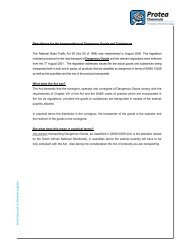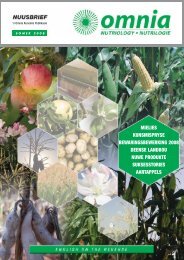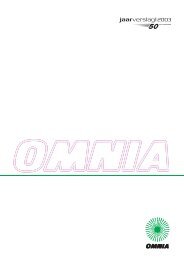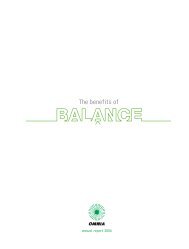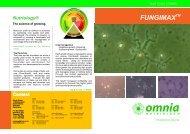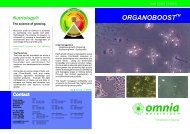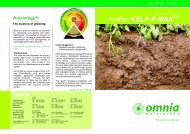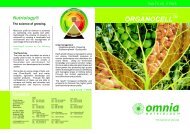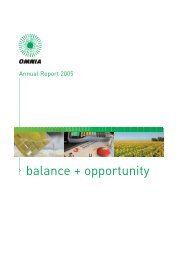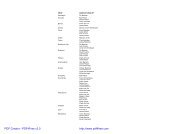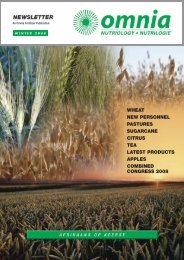omnia holdings annual report 2010 omnia holdings annu
omnia holdings annual report 2010 omnia holdings annu
omnia holdings annual report 2010 omnia holdings annu
You also want an ePaper? Increase the reach of your titles
YUMPU automatically turns print PDFs into web optimized ePapers that Google loves.
implemented to introduce a technological approach to farming,<br />
and the principle of investing 50% of profits back into inputs<br />
for the next season has been agreed with the farmers.<br />
Yields of up to eight ton per hectare of maize have been<br />
recorded and all of the 14 farmers currently participating in<br />
the initiative are profitable. This project has grown to more<br />
than 3 700 hectares in 2009, with a finance requirement of<br />
R20 million as these farmers expanded their farming operations.<br />
Crop rotation practices have been introduced, as well as further<br />
investment in equipment.<br />
One of the challenges going forward will be to increase the<br />
farmers’ footprint so they can operate on a more commercial<br />
scale and leverage the benefits of economies of scale.<br />
Omnia is a full-time partner in the initiative, providing project<br />
management, dedicated agronomical support, products, services<br />
and training support.<br />
In <strong>2010</strong>, Omnia obtained finance from the Land Bank to assist<br />
participating farmers in the Dryden project, as well as 10 farmers<br />
from the Free State. The project was subsequently renamed the<br />
Land Bank project, and a section 21 company, the Grain Farmer<br />
Development Agency (GFADA), was established through the<br />
Value Chain Network.<br />
Two of Omnia’s personnel function as project managers in the<br />
Dryden and the Free State areas where the project is being<br />
implemented, and are also involved in marketing the grain<br />
produced. They successfully negotiated and established a<br />
partnership with NU-Pro commodities in Bethlehem to assist<br />
with the forward contracting of grain, which means that about<br />
50% of farmers’ grain was contracted at a price almost<br />
R250 per ton higher than the current SAFEX price – a big step<br />
in making these farmers more profitable.<br />
Discussions with the Land Bank are also under way to increase<br />
the number of farmers in this project for the next season, while<br />
discussions have been initiated with the Bank to assist the VKB,<br />
OVK and NWK co-operatives, with whom Omnia has established<br />
further agricultural development projects. If Omnia’s negotiations<br />
with the Land Bank to assist these co-operatives and share their<br />
risk are successful, these initiatives will be in a position to<br />
expand much more rapidly.<br />
Lowveld emerging farmers<br />
Omnia’s involvement with emerging farmers in the Lowveld<br />
commenced in 1998, with the South African Sugar Association’s<br />
launch of the first sugar cane projects in the area. Omnia<br />
disseminates knowledge of plant nutrition management and the<br />
principles of sugar cane fertilization during numerous farmers’<br />
days held at the different projects. This assists emerging<br />
farmers to build successful businesses, as they are able to gain<br />
an understanding of all aspects of sugar cane production. More<br />
recently, finding solutions for finance availability for these<br />
farmers has become an additional focal point.<br />
The Bethlehem Farmers’ Trust<br />
The Bethlehem Farmers’ Trust (BFT) was established in<br />
Bethlehem in 1998, with the intent of progressing land reform<br />
in South Africa by establishing emerging farmers in local<br />
communities to produce apples in the eastern Free State as<br />
a sustainable agriculture project. The project is financed by<br />
the Industrial Development Corporation (IDC), and Omnia<br />
OMNIA ANNUAL REPORT <strong>2010</strong> 51<br />
contributes agronomic advice, farming skills and fertilizer<br />
products. This 110-hectare apple project has been very<br />
successful and the majority of the produce is destined for<br />
the export market.<br />
Batswa ko Pele<br />
A collaborative project with the NWK co-operative to support<br />
20 black farmers growing maize and sunflower on about<br />
3 000 hectares in the North West, this project is now in its<br />
third year. Although implementation during the first year proved<br />
problematic, mainly due to difficulties in sourcing adequate<br />
finance, “teething” problems have been overcome and the<br />
farmers are going from strength to strength. In the last two<br />
years of the intervention, all the farmers were profitable.<br />
Omnia is a full-time partner in this project, providing dedicated<br />
agronomic support, products, services and training.<br />
Agristart<br />
Although the Agristart initiative has been in existence for a few<br />
years, it has experienced difficulties due to a lack of finance and<br />
the non-continuity of financiers. Based in the previous<br />
Bophuthatswana homeland, it also holds a unique challenge in<br />
that farmers rarely own more than 15 hectares each – really too<br />
small to establish viable commercial enterprises. This requires<br />
that progressive farmers need to rent substantial tracts of<br />
additional land. In 2008, the project saw the introduction of the<br />
NWK co-operative as a long-term financier, with support from<br />
the Northwest Department of Agriculture, and has become very<br />
successful. It now consists of about 90 participating farmers<br />
planting maize and sunflower on close to 1 100 hectares.<br />
Omnia is a full-time partner in this intervention, providing<br />
dedicated agronomic support, products, services and training.<br />
In <strong>2010</strong>, the Agristart and Batswa ko Pele projects were<br />
combined to create a system where individual farmers can grow<br />
their businesses as viable, sustainable agricultural enterprises,<br />
and is now known as the NWK project.<br />
To further assist these farmers, NWK has embarked on a training<br />
programme which includes a broad spectrum of subjects – from<br />
financial management to cattle and crop farming – with the latter<br />
module presented by Omnia personnel.<br />
OVK Project<br />
A collaborative project in the South-eastern Free State with OVK,<br />
Grain SA and other role-players, this initiative has grown from<br />
humble beginnings to deliver very positive results. Now in its<br />
third year of implementation, the project is poised to grow<br />
significantly to 12 farmers planting 3 000 hectares in <strong>2010</strong>.<br />
VKB Project<br />
Omnia’s expertise in Agri-BEE projects has seen a new<br />
collaborative partnership established in 2008 with VKB in the<br />
eastern Free State. Starting out with six commercial farmers<br />
planting maize on 700 hectares but lacking proper support, the<br />
project already achieved significant positive results in its first<br />
year of operation, and grew to more than 8 500 hectares in<br />
2009. Omnia is a full-time partner in this initiative, providing<br />
project management, dedicated agronomic support, and<br />
products, services and training.<br />
Brooksby Project<br />
The Brooksby project is a unique initiative conceived by a white<br />
commercial farmer to uplift his neighbouring community by



